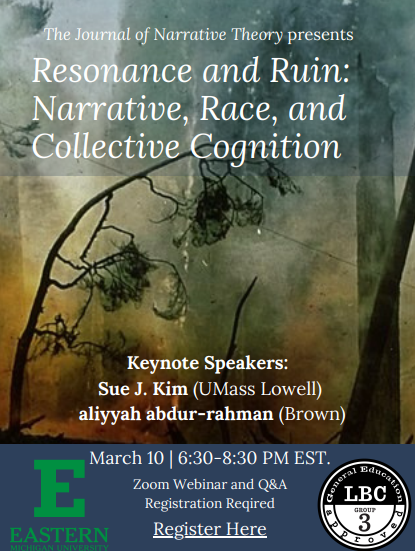JNT Dialogue Explores Cognitive Narrative Theory and Race
 The Department of English and the Journal of Narrative Theory would like to extend an invitation to members of the College of Arts and Sciences to attend their LBC-approved 2022 Dialogue virtual event 6:30-8:30 p.m. March 10.
The Department of English and the Journal of Narrative Theory would like to extend an invitation to members of the College of Arts and Sciences to attend their LBC-approved 2022 Dialogue virtual event 6:30-8:30 p.m. March 10.
The dialogue is an opportunity to collectively explore what cognitive narrative theory might teach us about the discourse around race in this complex historical moment.
This year's dialogue, titled "Resonance and Ruin: Narrative, Race, and Collective Cognition," will feature a conversation between two outstanding scholars, Dr. Sue J. Kim and Dr. aliyyah i. abdur-rahman.
To attend the webinar, fill out the Zoom registration form or go to the JNT: Journal of Narrative Theory's website for more information.
Dr. Sue J. Kim
Dr. Sue J. Kim is Professor of English and Co-Director of the Center for Asian American Studies at the University of Massachusetts Lowell.
This year’s Dialogue is inspired by her book, "On Anger: Race, Cognition, Narrative" (2013), which brings cognitive studies and cultural studies into dialogue to argue that predominant individualistic conceptions of anger and emotion are insufficient to explain its collective, structural, and historical nature.
Dr. Kim is also the coeditor (with Meghan M. Hammond) of Rethinking Empathy Through Literature (2014), and was guest editor for “Decolonizing Narrative Theory,” a special issue of the Journal of Narrative Theory (Fall 2012).
Dr. aliyyah i. abdur-rahman
Dr. aliyyah i. abdur-rahman is Associate Professor of American Studies and English at Brown University.
Her first book was "Against the Closet: Black Political Longing and the Erotics of Race" (2012). Dr. abdur-rahman’s second book, "Millennial Style: The Politics of Experiment in Contemporary African Diasporic Culture" (forthcoming from Duke UP), examines the interrelation of political terror, social abjection, and aesthetic abstraction in contemporary African Diasporic literary and visual media.
More on Narrative, Race, and Collective Cognition
Even as we find ourselves physically isolated by a pandemic, we participate in reading/listening communities that are shaped increasingly by media and cultural artifacts that narrativize and mediate our contemporary moment, creating, for better or worse, spaces of affect for us to inhabit.
Consequently, in an era when the illusion of the bourgeois liberal subject as independent, self-regulating and self-helping, has been exposed by national conversations about racism, we need to turn our attention to the complex phenomena of collective cognition and affect.
How do the communities we belong to and the narratives created and consumed in these spaces shape how and what we feel?
JNT’s annual Dialogue is unique in that it foregrounds the importance of collaboration and discussion.
Invited speakers not only present their expert research, but engage with each other’s work, and with questions prepared by members of the EMU community.
Questions to Consider
This year we will contemplate questions of narrative, affect, and collective cognition particularly as they pertain to contemporary American discourse around race: Our current condition is one of profound unfulfillment and a sense of stasis.
Some of these questions include:
- What are the aesthetic modes that help us survive, push through, and build relation in this space of disillusionment?
- Are what narrative theorist David Herman refers to as our “collective emotional standards” being changed by narrative forms that currently dominate our world?
- If, through their ability to summon anger or create empathy, political narratives have often been seen as the vehicles for action and agency, why and how are these stories failing us so frequently now?
- How have we yet to shift our approaches to narrative studies to account for these profound failures?
- What are the aesthetics that might chart a future without dictating what it might look like, or falling back on facile notions of liberal progress?
Visit the JNT: Journal of Narrative Theory's website for more information on this and past Dialogues

